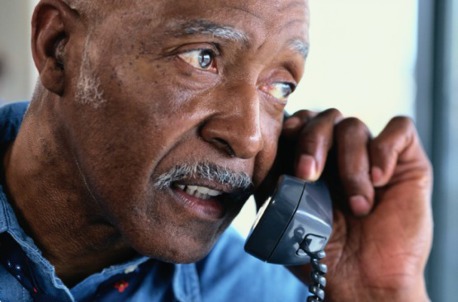Seniors should beware of the “grandparent scam” as it becomes a growing crime across the country. Scammers are impersonating a grandchild in distress and fleecing seniors of their savings.
 Since 2010, the FTC recorded more than 40,000 incidences of scammers impersonating a family member or friend in need of money. That number has grown into the millions.
Since 2010, the FTC recorded more than 40,000 incidences of scammers impersonating a family member or friend in need of money. That number has grown into the millions.
Scammers are calling grandparents and pretending to be their grandchildren in desperate need of cash. Unfortunately the scam has been particularly successful in getting seniors to send money.
You may wonder how a grandparent could be so easily tricked into sending money but it is surprisingly simple — that is with the help of social media. Facebook and other social media sites have unintentionally served as a conduit for a wealth of information con artists can use to trick the elderly.
After searching social media, scam artists are able to learn where grandchildren go to school, where they vacation and even their favorite foods. Once they learn everything they can about the grandchildren of potential targets they are well prepared.
How the Scam Works
A “grandchild” calls saying he’s been in an accident overseas and needs money for medical attention. A fake doctor may get on the line and speak on behalf of the injured grandchild. The fake doctor directs you to wire money for the treatment to proceed.
Another scenario is a “grandchild” calls asking for bail money, attorneys’ fees, airline or bus tickets and even car repairs.
The scammer may beg you not to call his parents and that it is urgent you respond immediately because the situation is dire. The person may sound like your grandchild but cannot talk for long because of the impending emergency.
Same Seniors Repeatedly Targeted
Some seniors may have unwittingly become part of a large-scale scam ring. Often, when a person falls for the scam, he or she is placed on a so-called “sucker lists.” The lists may be traded or sold between various scam rings. The same senior can be a repeat victim to different scams among the rings.
How Much Seniors Have Lost
The grandparent scam has grown over the years but unfortunately some of the seniors involved are embarrassed and don’t make police reports. But there are victims who are speaking out and the money they’ve lost is significant.
In April 2012, a Sammamish, Washington couple lost nearly $90,000 over several days to a caller who they believed was their grandson.
A Lee County, Florida woman put $1,000 on a “Green Dot” prepaid card for who she thought was her grandson needing money for unpaid tickets in February 2013.
In March 2013, a San Luis Obispo, California woman wired $75,000 from her Wells Fargo account after falling victim to a scammer saying he needed money to get out of jail and for attorney’s fees.
In May 2013 a New Jersey couple lost nearly $7,000 to a scammer posing as their grandson who allegedly needed bail money.
Scammers prey on the elderly using social media, marketing databases, telephone listings and a variety of sources to find information.
The emotional nature of the call of someone posing as a grandchild adds to the vulnerability of seniors. There are not many grandparents who would refuse to help their grandson or granddaughter in distress.
It’s instinctual to want to offer help and get it to them as soon as possible. But don’t. If you wire the money there is no getting it back. A wire transfer is instant, permanent and irreversible.
What Can Be Done
AARP suggests the following to keep your grandparents and other elderly loved ones safe:
First, resist the pressure to act quickly. That piece of advice comes from the Federal Bureau of Investigation (FBI). The fake grandchild says it’s an emergency in order to bypass your natural hesitation before parting with your money. Slow things down to short-circuit the scam.
Second, ask questions: what’s your mom’s name? What’s your favorite pet’s name? Where were you born? Your fake grandchild will flunk the test.
Third, ask for a phone number: if it’s really a relative, they won’t be shy about providing contact information. If it’s a “doctor” or “police officer,” they should be able to provide an office number. Yes, any phone number provided by a scammer will be fraudulent. However, you will be comforted that if it’s really your grandchild, the number will be legitimate and you can call him back after doing your own careful research.
Finally, and most important, hang up and call your grandchild’s home number or mobile phone number, and call his parents. You will discover he’s safe and sound. In the incredibly rare instance that the call actually came from a relative, you may call him or her back and make payment arrangements.
Here is a link to a video on the FBI website about the grandparent scam.
















